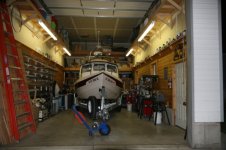bshillam
Member
- Joined
- Aug 21, 2007
- Messages
- 783
- Reaction score
- 0
- C Dory Year
- 1981
- Vessel Name
- Heaven To Me
I am going to be putting together a shop finally. I have wanted to work with wood for a long time and have been very pleased with what I have done thus far. Timing is allowing me to set up a wood working shop. Knowing there is moreexperience and knowledge out here I'd love to hear from some that have more experience in this area. Things I am looking at getting right away,
Table Saw
Band Saw
Dust collection
Probably a routing table
What other equipment is a must/very useful? What brands/models have you enjoyed working with?
I am also interested in the hand tools you use most often whether powered or classic. I will have electrician wire for the shop so 110/220 won't be an issue.
Thoughts?
Table Saw
Band Saw
Dust collection
Probably a routing table
What other equipment is a must/very useful? What brands/models have you enjoyed working with?
I am also interested in the hand tools you use most often whether powered or classic. I will have electrician wire for the shop so 110/220 won't be an issue.
Thoughts?

